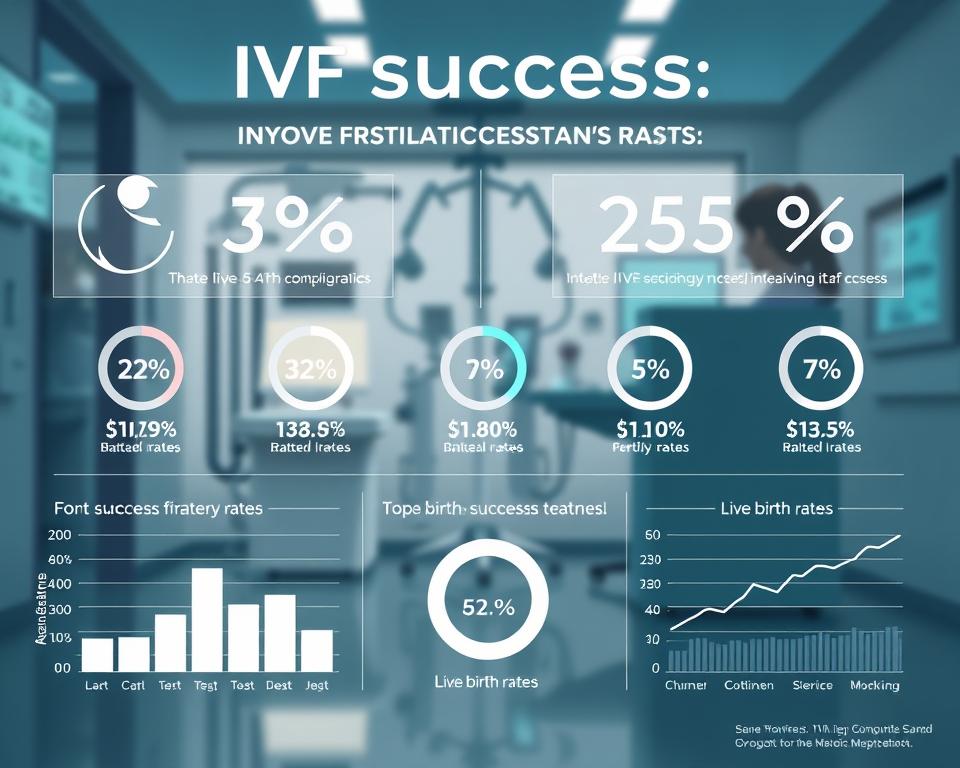Looking for Assistance? Reproductive & Infertility Endocrinologist
It may surprise you that about 10% of women in the United States struggle with conceiving? These numbers reveal the large number of people who could benefit from a reproductive & infertility endocrinologist. These experts are well-versed in reproductive health, providing personalized treatment plans.
If you’re having trouble conceiving, a consultation with Eliran Mor can make a difference. Collaborating with a fertility expert unlocks customized treatments. Such expert care is critical to tackle fertility challenges and improve reproductive function.
Understanding Reproductive Health
Reproductive health includes a wide spectrum of factors impacting male and female fertility. Grasping it is essential for boosting fertility and addressing reproductive disorders. It entails learning about hormones and the menstrual cycle’s detailed phases.
The menstrual cycle is a cornerstone of female reproductive health. It undergoes significant hormonal shifts, preparing the body for pregnancy. Disruptions can signal deeper issues and merit a specialist’s evaluation. Men face their own fertility hurdles, such as low testosterone or hormonal imbalances, impacting their reproductive capabilities.
Reproductive disorders affect men and women—examples include polycystic ovary syndrome (PCOS) in women and erectile dysfunction in men. These conditions pose significant barriers to successful conception. Consulting a hormone imbalance specialist can offer essential guidance and treatment plans to manage these issues effectively.

Role of a Reproductive & Infertility Endocrinologist
A reproductive endocrinology physician is key in diagnosing and treating infertility. They have specialized training to address diverse fertility concerns. They focus on hormonal assessments and fertility testing to determine infertility factors.
Using cutting-edge methods, they assess hormone profiles and ovary performance. This is vital in identifying barriers to conception. Their work is essential in helping patients overcome fertility challenges.
Together with patients, they design individualized care strategies. These plans may include endocrinology services like IVF, medication, and lifestyle changes. Such tailored care meets specific needs and improves success rates.
They also provide emotional and physical support to those facing infertility. By educating patients about their options, they help them through the complex treatment choices. Their knowledge is a valuable asset for patients pursuing fertility help.
When to See a Fertility Specialist
Struggling to conceive happens frequently. Recognizing the signs of infertility is crucial for deciding when to seek a fertility specialist. Skipped or irregular periods can signal endocrine issues impacting fertility. Tracking your cycle can reveal ovulation patterns and issues that may require a visit to an infertility treatment center.
Age also plays a significant role in fertility. Women over 35 may face challenges not seen in younger individuals. Understanding age effects on fertility helps determine the right time for expert help.
Previous unsuccessful attempts at pregnancy are also significant. If you’ve tried for a year or more without success, a fertility specialist can be very helpful. Timely specialist care can enhance success rates and your parenthood prospects.
Meet Dr. Eliran Mor: A Leader in Reproductive Endocrinology
Dr. Eliran Mor is a leading figure in reproductive endocrinology. He focuses on infertility treatment, making him a respected infertility doctor at a top clinic. His qualifications and experience make him a leading endocrinology expert. His tailored treatment plans and innovative methods raise the likelihood of a positive outcome.
Patient Reviews and Satisfaction
Dr. Eliran Mor’s patient satisfaction ratings are exceptional, showing his dedication to quality care. He has a 4.6 out of 5 rating from 102 reviews, indicating high trustworthiness. Reviewers praise his thoroughness and empathetic style. They reflect both his skill and the clinic’s welcoming atmosphere.
Why Choose Dr. Eliran Mor?
Choosing Eliran Mor for your infertility journey is smart. His deep knowledge in reproductive endocrinology helps him handle complex cases effectively. He focuses on customized strategies to meet specific needs. He continually adopts new techniques, ensuring top-notch care.
Infertility Treatment Options
Understanding the various infertility treatment options is essential when facing fertility challenges. Each method has its own process and outcomes, significantly impacting your journey. The most well-known treatments include in vitro fertilization (IVF), intrauterine insemination (IUI), and ovulation induction.
In vitro fertilization (IVF) consists of egg retrieval, lab fertilization, and embryo transfer. It’s often recommended for those with blocked fallopian tubes, advanced age, or unexplained infertility.
Intrauterine insemination (IUI) places sperm into the uterine cavity at ovulation. It’s useful for mild sperm issues or cervical factor fertility challenges.
Ovulation induction uses drugs to trigger egg production. It’s commonly advised for individuals with irregular ovulation patterns or hormonal imbalances.
Seeking the right infertility treatment expert is vital. Discuss your concerns and goals with a specialist to find the best treatment for your situation. Each option has its own considerations, such as costs, emotional impacts, and success rates. A detailed conversation with your chosen professional is necessary.
| Treatment | Process | Best For | Success Rate |
|---|---|---|---|
| IVF | Egg retrieval, fertilization, embryo transfer | Blocked tubes, advanced age, unexplained infertility | 40-50% per cycle |
| IUI | Sperm placement in uterus | Mild male factor infertility, occasional ovulation issues | 10-20% per cycle |
| Ovulation Induction | Medications to stimulate egg production | Irregular ovulation | 10-15% per cycle |
Hormonal Therapy and When You Need It
Hormonal therapy is essential in addressing reproductive health issues. Imbalances in hormone levels can severely impact fertility and reproductive health. A hormone imbalance specialist can help determine if hormonal treatments are right for you. You may require therapy if you have erratic cycles, infertility, or perimenopausal signs.
There are various hormonal therapy options available, each tailored to individual needs. Selecting the optimal hormonal approach enhances outcomes.
Types of Hormonal Treatments Available
- Hormone Replacement Therapy (HRT): Primarily used to ease menopausal symptoms and restore hormonal balance.
- Clomiphene Citrate: Prescribed to encourage ovulation in women struggling to conceive.
- Gonadotropins: Injectable endocrine agents to boost egg production in ART.
All these therapies play pivotal roles in endocrine fertility care. Understanding and consulting on these therapies allows smart health choices.
Benefits of Visiting a Reproductive Wellness Center
Visiting a reproductive wellness center can significantly boost your path to fertility. They provide dedicated expertise to enhance fertility. With a team of experts, you get a treatment plan that covers all angles of infertility.
State-of-the-art tools define these clinics. You receive personalized care backed by the latest technological advances. Such advanced approaches yield higher success compared to conventional clinics.
Emotional support is a key advantage of infertility clinics. Dealing with fertility issues can be tough, but these centers provide counseling and support groups. It nurtures both mind and body for comprehensive care.
Here’s a comparison of what reproductive wellness centers offer versus traditional clinics:
| Feature | Reproductive Wellness Center | Traditional Clinic |
|---|---|---|
| Multidisciplinary Team | Yes | No |
| Advanced Technology | State-of-the-art | Standard |
| Emotional Support | Comprehensive services | Limited |
| Personalized Treatment Plans | Tailored to individual needs | Generalized |
The advantages of infertility clinics go beyond medical care. A reproductive wellness center creates a supportive environment for your fertility journey.
Finding the Right Infertility Clinic for You
Deciding on an infertility clinic is a pivotal choice. With many options available, knowing what to look for can make the decision easier.
Start by examining the clinic’s success rates. Good statistics reflect quality and proficiency. Ensure their services align with your situation.
Be sure to read patient testimonials. They offer insights into others’ experiences and can reveal both the clinic’s strengths and weaknesses. Look for feedback on the staff, the clinic’s atmosphere, and the support during treatment.
Scheduling a consultation is also beneficial. This meeting lets you evaluate the facility and methods personally. You can ask about treatment plans, financial help, and emotional support services. Feeling comfortable with your infertility doctor is key.
| Factor | Considerations |
|---|---|
| Success Rates | Research the clinic’s statistics for specific procedures. |
| Patient Reviews | Read feedback on platforms for detailed insights. |
| Consultation | Utilize initial meetings to gauge compatibility with the doctor and staff. |
| Services Offered | Ensure the clinic provides the necessary treatments and support. |
Wrapping It Up
Your path to reproductive health may require a visit to a reproductive & infertility endocrinologist. They develop bespoke solutions for your situation. They ensure you get the care you need on your journey to parenthood. Knowing the indicators prompts timely specialist consultation.
Tailored treatment is essential in infertility care. The right support empowers you to make informed decisions about your reproductive health. This leads to better outcomes and peace of mind. Note that expert guidance customizes your path effectively.
By taking a proactive stance, you can manage your reproductive health and explore paths to starting or expanding your family. Consult a specialist to obtain personalized fertility solutions.
FAQ
What is the role of a reproductive & infertility endocrinologist?
An infertility endocrinologist specializes in identifying and managing fertility disorders. They perform hormonal assessments and fertility testing. They formulate tailored therapies for each patient’s fertility needs.
When should I consider seeing a fertility specialist?
See an expert when you notice cycle irregularities, age factors, or extended infertility. If previous pregnancy attempts have been unsuccessful, seeking their help is also advisable. Early intervention can greatly improve treatment success.
Which infertility treatments can I consider?
Available options range from IVF and IUI to medication-induced ovulation. Each approach varies in procedure and success rates. This allows individuals to make informed decisions about their fertility journey.
Which hormonal therapies treat fertility issues?
Major options encompass HRT, clomiphene citrate, and gonadotropic injections. All therapies serve distinct roles and vary in efficacy.
Why is hormonal therapy important for reproductive health?
Hormone treatments restore endocrine equilibrium critical to conception. Consulting a hormonal therapy doctor is necessary to determine when such treatment is required for your health.
What services do reproductive wellness centers offer?
At a reproductive wellness center, you’ll find a multidisciplinary team, cutting-edge technology, and a range of services. They address physical health and provide emotional care.
How do I choose the right infertility clinic?
Research success metrics, service range, and testimonial quality. They help you select the most suitable fertility center.
What qualifications does Dr. Eliran Mor have?
He holds advanced credentials and extensive clinical experience in fertility care. He tailors therapies and integrates the latest innovations for optimal results.
How satisfied are patients with Dr. Eliran Mor’s care?
With a 4.6/5 average from 102 reviews, patient trust is high. It highlights his commitment to excellence and patient satisfaction.

